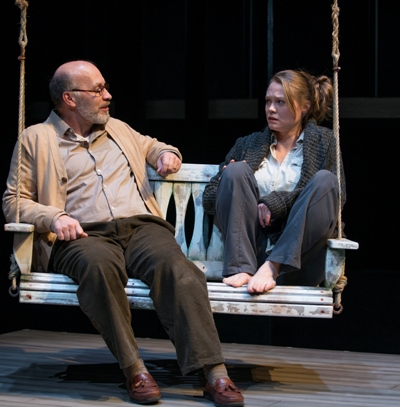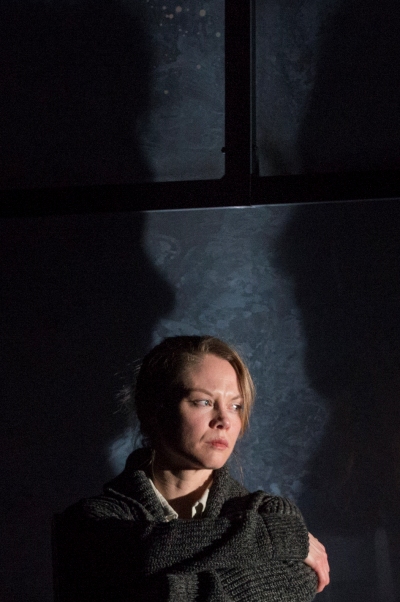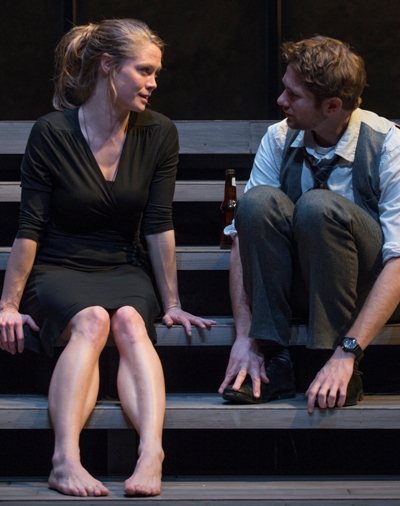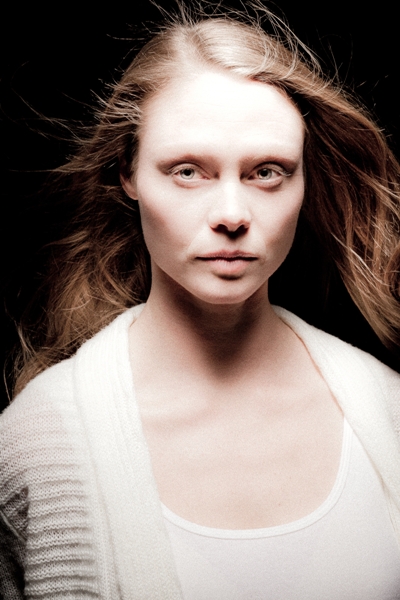Role Playing: Chaon Cross turned Court stage into a romper room finding answers in ‘Proof’
 Interview: The actor says director Charles Newell told her to go for it in visceral exploration of smart but troubled character in David Auburn’s play, at Court Theatre through April 14.
Interview: The actor says director Charles Newell told her to go for it in visceral exploration of smart but troubled character in David Auburn’s play, at Court Theatre through April 14.
By Lawrence B. Johnson
The interpretive quest that led Chaon Cross to her fierce, blazing portrayal of Catherine, the brilliant but unmoored young woman in David Auburn’s “Proof” at Court Theatre, began in rehearsals with a lot of running around, getting under furniture and throwing things.
 “I have narrowed and refined her behavior, but all through rehearsals, previews and even into the actual run, Charlie was willing to let me roam and do anything I wanted,” say Cross, referring to director Charles Newell. “At first, it was the more bizarre the better. We just wanted to examine Catherine’s impulses. It was a cartoonish place.”
“I have narrowed and refined her behavior, but all through rehearsals, previews and even into the actual run, Charlie was willing to let me roam and do anything I wanted,” say Cross, referring to director Charles Newell. “At first, it was the more bizarre the better. We just wanted to examine Catherine’s impulses. It was a cartoonish place.”
Chaon Cross (whose first name is pronounced Shawn) is talking about the tormented daughter of a fictional mathematics genius called Robert (played by Kevin Gudahl), a living legend in the math world and former professor at the University of Chicago. But for many years Robert has suffered from dementia, and therein lies the root of Catherine’s own troubles. Though her older sister Claire, who lives in New York, has provided financial support, Catherine, who is about 25, has insisted on caring for her father in their run-down home. She has dropped out of college and sacrificed normal social relationships. Her father has recently died, yet in her mind he is vividly present. Catherine is is bereft, and lost.
 “There’s a need in her for someone else to believe in her,” says Cross, an Arkansas native who arrived on the Chicago theater scene in 2001 after studies at Oxford University, a series of tutorials at the Royal Shakespeare Company and work with the American Shakespeare Center in Virginia. “It is a story of someone reaching out, someone who needs to be loved in a way that can propel her forward. David Auburn’s first scene description says, ‘She sits in disheveled clothes. She is exhausted.’
“There’s a need in her for someone else to believe in her,” says Cross, an Arkansas native who arrived on the Chicago theater scene in 2001 after studies at Oxford University, a series of tutorials at the Royal Shakespeare Company and work with the American Shakespeare Center in Virginia. “It is a story of someone reaching out, someone who needs to be loved in a way that can propel her forward. David Auburn’s first scene description says, ‘She sits in disheveled clothes. She is exhausted.’
“She’s intellectually exhausted as well. What she feels, I imagine, is something everybody can identify with – the need for someone to cut you a break.”
The proof in the play’s title is multifaceted. While it might seem to deal primarily with the question of whether this very bright child of a genius has written an astonishing mathematical proof, the more profound matters, says Cross, concern the personal validation Catherine seeks: the proofs of her own worth and of her mental health.
“As a cast, we did talk a lot about back story,” she says. “We created a time line and made things up, focusing on Catherine’s relationship with her father. That’s what she knows best. She’s spent half of her adult life caring for him, alone with him. We supposed that Robert was always a very strong character, quite eccentric and difficult to live with, a mastermind whose word was the be-all of what goes down.
 “He’s the reason they live where they live, and he holds the power in their relationship. Robert can’t operate without Catherine, and Catherine needs him. They’re constantly playing games, always trying to one-up each other logically. David Auburn also gave us some back story stuff. He said from a very young age, Catherine and Robert have had a very deep connection, which helps to explain her dual reality now that her father is dead. She’s aware she’s talking to someone who is dead, but sometimes she mixes reality with fantasy.”
“He’s the reason they live where they live, and he holds the power in their relationship. Robert can’t operate without Catherine, and Catherine needs him. They’re constantly playing games, always trying to one-up each other logically. David Auburn also gave us some back story stuff. He said from a very young age, Catherine and Robert have had a very deep connection, which helps to explain her dual reality now that her father is dead. She’s aware she’s talking to someone who is dead, but sometimes she mixes reality with fantasy.”
Cross says she literally marked off, in the script, those moments when Catherine is thinking or acting independently, on an entirely realistic level, from those other times when she imagines she’s talking to her father.
“She’s capable of exceptional thinking. She’s also a fighter. She got a lot of that from her father. She’s a wild child in that she was raised in this house – raised by this mentally ill person. Consequently, she’s had very little social upbringing, we decided. She’s removed from normal everyday life, in part by habit but also because that’s how her brain operates. She has chosen to take care of her father, which I think shows emotional and moral fortitude, real strength, even ferocity. Of course, it’s also a huge burden.”
A connection to the outside world, to a life, seems to enter Catherine’s closed sphere in the form of Hal (Erik Hellman), a graduate student who tutored with her father. Indeed, there seems to be more than math to this boy-girl equation. But when Hal fails to acknowledge Catherine’s potential, he breaks their mutual trust, which breaks her heart.
The issue of trust also looms large between the two sisters. With every good intention, albeit with the usual baggage of sibling rivalry, Claire (Megan Kohl), who is four or five years older, shows up after their father’s death to help Catherine establish some normalcy in her life. Claire, married, is a currency analyst, smart and pragmatic. She also understands only too well that Catherine got a lot more of their father’s mental wherewithal, not that it’s ever done little sister much good.
 “We decided that while I’m like my father, Claire is like my mother, who died when we were young: strong, sure-footed, rational,” says Cross. “Claire has basically worked 14 hours a day to support these two shut-ins. When she arrives, it’s with layers and layers and layers of past history and behavioral patterns, the way families operate. You always attempt to change, but then you go right back to old perceptions.
“We decided that while I’m like my father, Claire is like my mother, who died when we were young: strong, sure-footed, rational,” says Cross. “Claire has basically worked 14 hours a day to support these two shut-ins. When she arrives, it’s with layers and layers and layers of past history and behavioral patterns, the way families operate. You always attempt to change, but then you go right back to old perceptions.
“I think Catherine and Claire try to find the love, the place where they connect, but we have just three scenes together so it’s not all that much to work with. It’s more like ‘here we go again, this is how I get treated’ – from both points of view. And there’s the exchange over the (math) proof, which Catherine claims she wrote. Claire says that if she really did write it, ‘You could tell us the proof.’ But Catherine says, ‘You wouldn’t understand it, it’s not a muffin recipe.’ Those are the weapons we use against each other.”
Though events on stage plunge forward with great emotional force, says Cross, to achieve that slashing edge director Newell initially slowed the pace to a crawl of careful dramatic analysis.
“All through the script, David Auburn uses the word ‘beat,’ meaning he wants a distinct pause, not just for a breath but to process something that has just happened or just been said. When Claire tells Catherine she has sold the house, we see the word ‘beat’ before Catherine replies, ‘What?’ One of Charlie’s ways into the play was to stop at every occurrence of ‘beat’ and discuss what’s going on, why the playwright wants the moment to freeze.
“Charlie was very specific about this being a journey towards self-identity. It was a fast, and furious, violent and ripping experience to separate from one’s primary parent, and then to claim who it is that you are apart from them. That violent and ripping feeling was where we started. Catherine’s proof is her stepping into who she is regardless of who anyone else thinks she is, and embracing talents that are very specific to only her.”
Related Links:
- The compleat Chaon Cross: See all the roles she has played here
- Review of “Proof”: Read it at ChicagoOntheAisle.com
- David Auburn talks about “Proof”: Read the interview here
- Preview of Court Theatre’s 2012-13 season: Get the details at ChicagoOntheAisle.com
- Dion Johnstone turned outsider Antony to bloody purpose in ‘Julius Caesar’
- Noir films gave Justine Turner model for shadowy dame in ‘Dreadful Night’
- Anish Jethmalani plumbs agony of good man battling demons in ‘Bengal Tiger’
- Gary Perez channels his Harlem youth as quiet, unflinching Julio in ‘The Hat’
- Kamal Angelo Bolden sharpened dramatic combinations to play ‘The Opponent’
- In wheelchair, Jacqueline Grandt explores paralysis of neglect in ‘Broken Glass’
- James Ridge thrives in cold skin of Shakespeare’s smiling serpent, Richard III
- Stephen Ouimette brews an Irish tippler with a glassful of illusions in ‘Iceman’
- Ian Barford revels in the wiliness of an ambivalent rebel in Doctorow’s ‘March’
- Chuck Spencer flashes a badge of moral courage in Arthur Miller’s ‘The Price’
- Rebecca Finnegan finds lyrical heart of a lonely woman in ‘A Catered Affair’
- Bill Norris pulled the seedy bum in ‘The Caretaker” from a place within himself
- Diane D’Aquila creates a twice regal portrait as lover and monarch in ‘Elizabeth Rex’
- Dean Evans, in clown costume, enters the darkness of ‘Burning Bluebeard’
- Dan Waller wields a personal brush as uneasy genius of ‘Pitmen Painters’
- City boy Michael Stegall ropes wild cowboy in Raven Theatre’s ‘Bus Stop‘
- Brent Barrett is glad he joined ‘Follies’ as that womanizing, empty cad Ben
- Sadieh Rifai zips among seven characters in one-woman “Amish Project”
- Kirsten Fitzgerald inhabits sorrow, surfs the laughs in ‘Clybourne Park‘
- Janet Ulrich Brooks portrays a Russian arms negotiator in ‘A Walk in the Woods‘
Photo captions and credits: Home page and top: Actor Chaon Cross. (Photo by Joe Mazza) Descending: Chaon Cross as Catherine with Kevin Gudahl as her father Robert. As Catherine, alone and troubled. With Erik Hellman as Hal. (Production photos by Michael Brosilow) On Youtube, a scene from David Auburn’s “Proof” at Court Theatre. Chaon Cross. (Photo by Joe Mazza)
Tags: "Proof", Chaon Cross, Charles Newell, Court Theatre, David Auburn, Erik Hellman, Kevin Gudahl, Megan Kohl


No Comment »
6 Pingbacks »
[…] Chaon Cross turned Court stage into a romper room finding answers in ‘Proof’ […]
[…] Chaon Cross turned Court stage into a romper room finding answers in ‘Proof’ […]
[…] Chaon Cross turned Court stage into a romper room finding answers in ‘Proof’ […]
[…] Chaon Cross turned Court stage into a romper room finding answers in ‘Proof’ […]